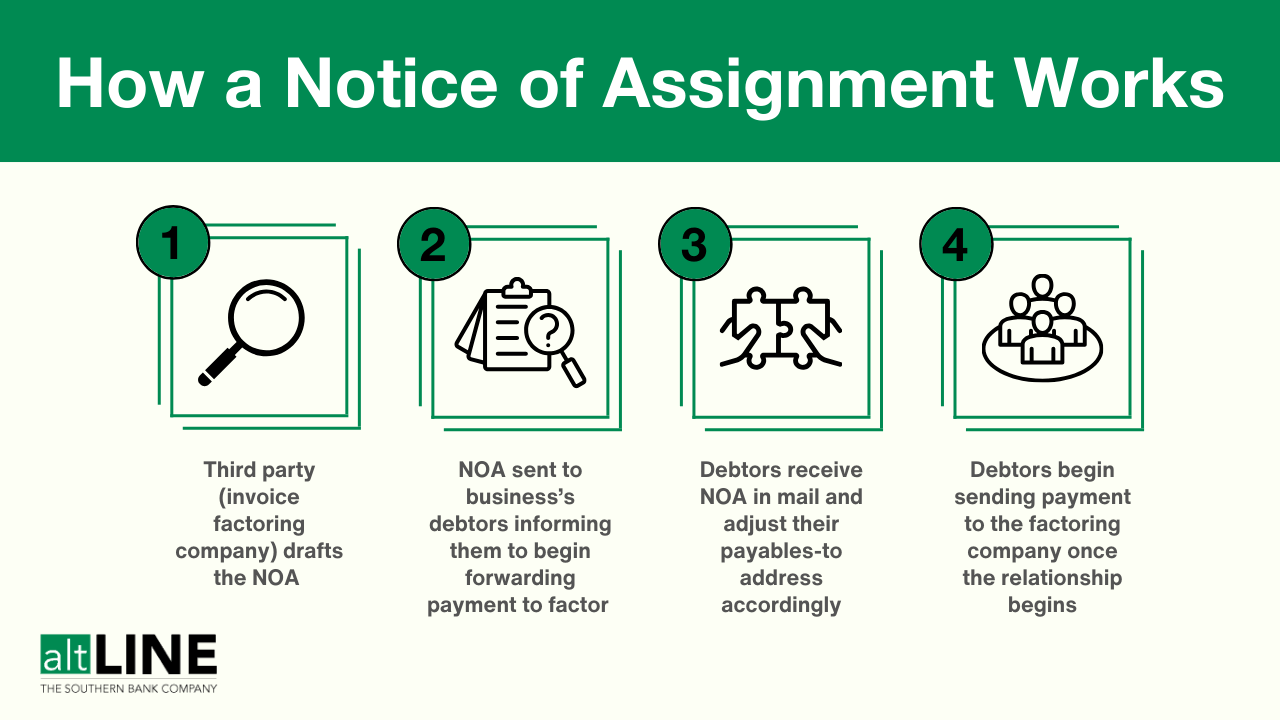Last Updated October 14, 2025
If you’re a business owner considering invoice factoring, the notice of assignment (NOA) may cause you some confusion or even concern.
What will my customers think? Why is an NOA necessary? Perhaps you might not even fully understand what an NOA is.
Let’s address these questions to clarify what a factoring notice of assignment covers and put to rest any lingering apprehension.
Key Takeaways
- A Notice of Assignment (NOA) informs your customers that a factoring company will manage your invoices and collect payments, ensuring money is sent to the correct place.
- The NOA provides legal protection for the factoring company by showing who owns the invoices and reducing the risk of misdirected payments.
- Most customers are familiar with invoice factoring, so businesses are often more concerned than their clients. Factoring is a common and accepted way to manage cash flow.
- The NOA typically includes a notice that invoices have been assigned, updated payment instructions, and a reminder that customers are responsible if a payment is sent incorrectly.
What Is a Factoring Notice of Assignment
The notice of assignment (NOA) informs your customer that a third party (bank, financing company, or factoring company) will manage and collect your accounts receivable (AR) going forward. The NOA arrives in the mail in the format of a letter, as the initial communication notifying your customers of the change in structure and process.

Notice of assignments are particularly common within the trucking industry, since freight factoring is such a widely utilized form of financing for trucking business owners.
Why Is a Factoring NOA Important?
In a factoring relationship, a business sells the future collection of accounts receivable (AR) in exchange for cash advances. So, the outstanding receivables belongs to the factoring company upon completion of the work or delivery of the goods. The business receives the cash advance, and the third party waits for payment by the business’ customer.
Mildred Glaze, Senior Account Manager at altLINE, explains factoring NOAs further.
“The factor sends out the notice of assignment to be sure they place their client’s customers on notice to submit all payments to the factor and not to their client. The factor will essentially become their client’s accounts receivable department, documenting invoices and payments.”
Due to the intangible nature of AR, the third-party provider needs legal language showing ownership of the AR. Thus, the legal language found in the NOA minimizes the risk placed on the third-party provider. Third party providers require an NOA. It is critical to the structure of the factoring relationship and protects the third-party provider in the event of misdirected payments.
In the case of a redirected payment, Glaze explains, “If a payment is in inadvertently sent to the client [instead of the factoring company], then the client turns around and forwards/sends the original method of payment to the factor…We then turnaround and re-notify that particular customer to have them confirm updating the remittance in their system.”
What Is Covered in a Notice of Assignment?
The main points covered in a Notice of Assignment include:
- Business’ accounts receivable has been assigned and is payable to a third party provider
- Updated payment address, typically a lock box
- Liability on the customer in the event of misdirected payment
Why Factor Invoices With altLINE
By working with altLINE, your customers recognize the reliability and stability of your financing partner. Rather than receiving an NOA from an unknown entity or independent financing company, the bank’s reputation as the lender of choice strengthens your customer relationship.
Read our article on the benefits of factoring through a bank for more information or get a free quote today!
Notice of Assignment FAQs
What will my customers think about the notice of assignment?
Tremendous growth in the use of invoice factoring across many industries has made factoring more common than ever. According to a recent report, the global factoring market is expected to grow over 10% annually for the next several years.
Many of our factoring clients work with Fortune 500 companies who simply demand longer payment terms in order to do business. These companies are used to working with business partners who factor their invoices. Clients using invoice factoring often show an appetite for accelerating growth and more efficiently managing operations and collections.
In short, you are most likely more concerned about it than your customers. Factoring is a widely used, recognized, and acceptable means for financing your business.
What does a notice of assignment mean in trucking?
A notice of assignment (NOA) is a document that notifies your customers that your factoring company has the right to collect payments on invoices. In a factoring relationship, a business sells its invoices to a third-party factoring company, which then collects payment on them. An NOA notifies your customers of this change in structure.
Who provides a notice of assignment?
While some factoring companies will allow you to send your own NOAs to your customers, most will send them on your behalf.
Grey was previously the Director of Marketing for altLINE by The Southern Bank. With 10 years’ experience in digital marketing, content creation and small business operations, he helped businesses find the information they needed to make informed decisions about invoice factoring and A/R financing.











